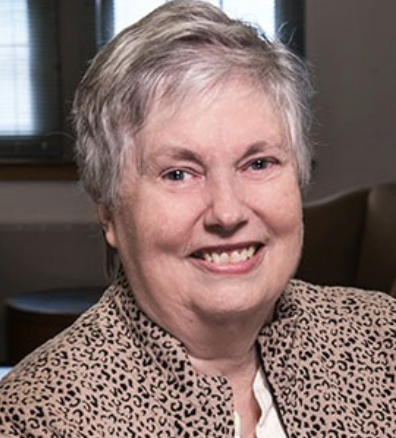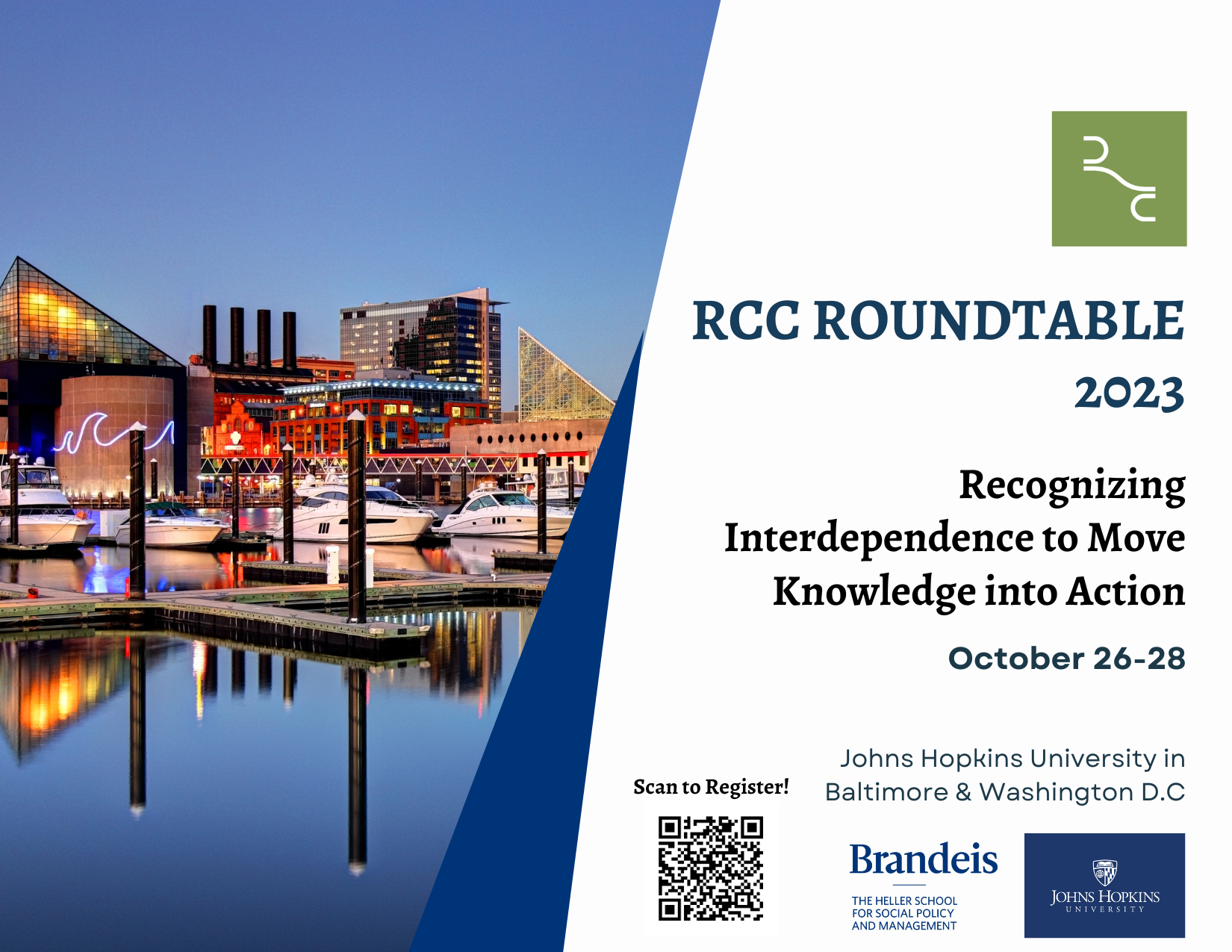
Roundtable 2023 Program

Program (PDF)
Day 1: Thursday Oct. 26
Johns Hopkins Capitol Hill, 555 Pennsylvania Avenue, NW, Washington, DC
11:00-12:00 Transport from Baltimore Inner Harbor Hotels to Capitol Hill
Bus #1 with Host: Jill Williams
- Baltimore Marriott Waterfront (10:30am)
- Sagamore/Pendry/Fells Point – Baltimore (10:45am)
- Hyatt Place Baltimore/Inner Harbor (11am)
Bus #2 with Host: Kathy McDonald
- Hyatt Regency Baltimore Inner Harbor (10:45am)
- Hyatt Place Baltimore/Inner Harbor (11am)
12:00-1:30 Gather for Welcoming Lunch
Kathy McDonald (Schools of Nursing, Medicine, Public Health and Business, Johns Hopkins University)
John Paul Stephens (Weatherhead School of Management, Case Western Reserve University)
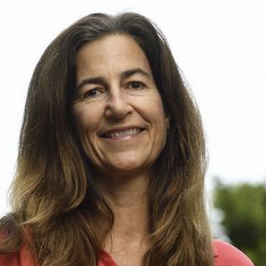
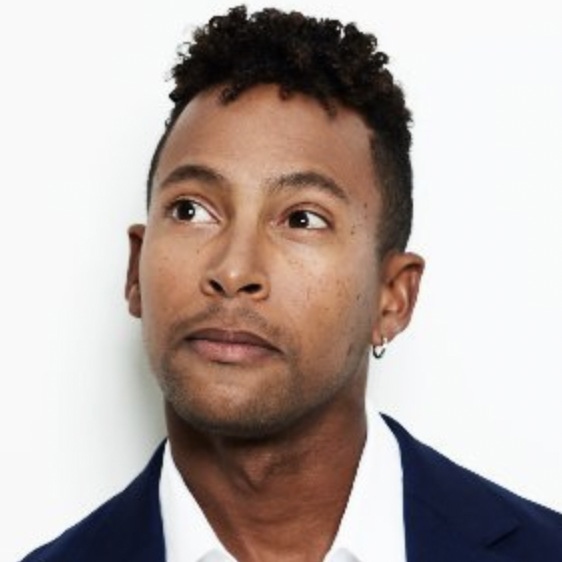
1:30-4:30 Welcoming Activities
Polarization in the National Capital - Exploring Solutions
Join Abdullah Clark (National Defense University, George Washington University) and John Paul Stephens (Case Western Reserve University) to explore the January 6th insurrection, Black Lives Matter protests, and Operation Warp Speed, exploring solutions to address conflict and bring people together across differences.National Memorial Walk - Learning About Leadership
Join Jody Hoffer Gittell (Brandeis University), Martha Gerrity (VA Health System Portland, Society of General Internal Medicine) and Kathie Sutcliffe (Johns Hopkins University) to explore national memorials on the Potomac Basic - the Lincoln Memorial, the Franklin Delano Roosevelt Memorial, the Martin Luther King Jr. Memorial and the United States Holocaust Memorial Museum. We will arrange transportation to the starting point but we recommend you bring comfortable walking shoes!Washington D.C. Mayor's Innovation Team
Join Mayor Muriel Bowser’s Washington D.C. Innovation Team (i-team) at the D.C. City Hall to learn how research and innovation are being put into action through policy, program and systemic city change. Joined by senior leaders in the D.C. Technology Office, Budget Office and Innovation Lab, the i-team will facilitate a short discussion on how to transact change in cities using research as the basis. Then take a tour of City Hall to see where policy in the nation’s capital is made.
Hidden Gems
Join Kathy McDonald (Johns Hopkins University) and Alice Andrews (Dell Medical School; Geisel School of Medicine at Dartmouth Hitchcock) to explore little known treasures of D.C.
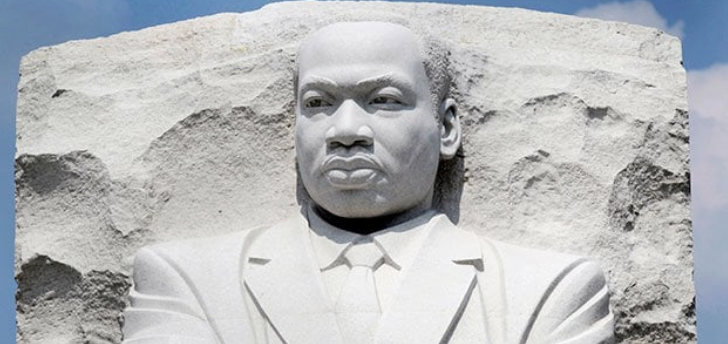 4:30-6:00 Keynote and Discussion
4:30-6:00 Keynote and Discussion
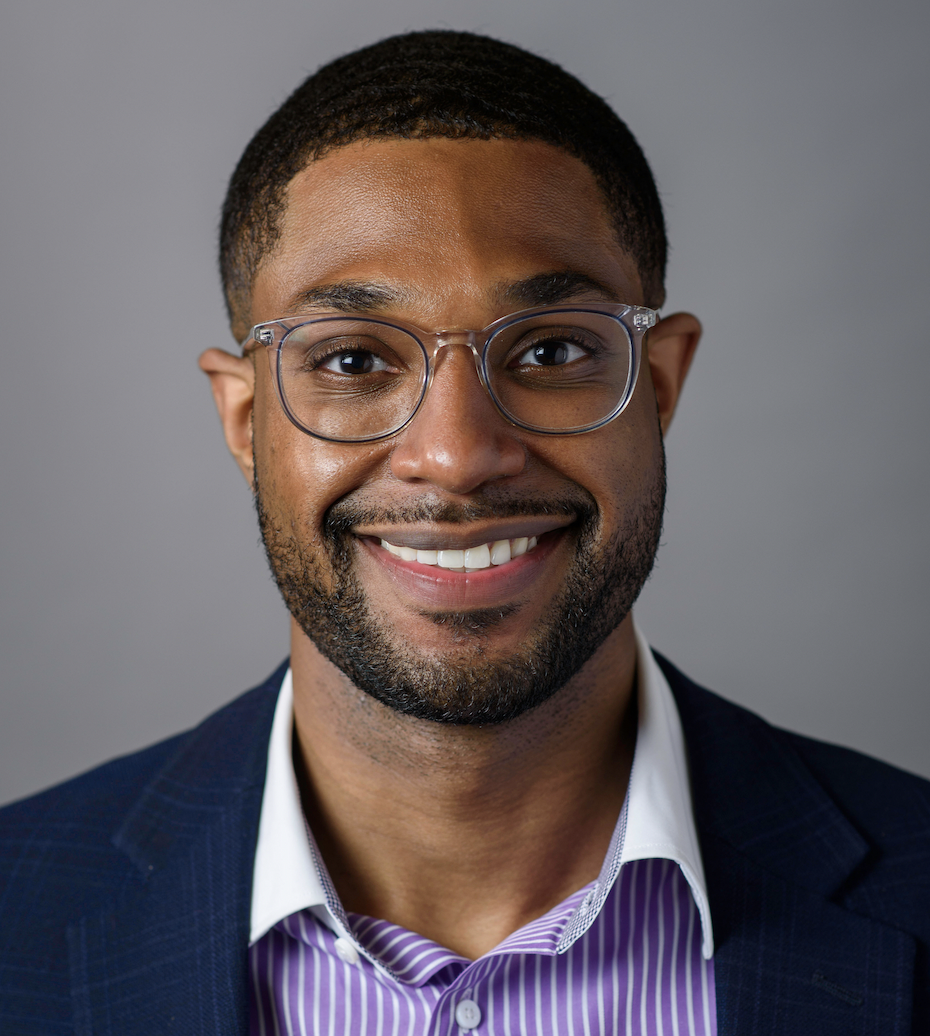 Zachary Hylton, Founder, E. LLC, PhD Student, Brandeis University
Zachary Hylton, Founder, E. LLC, PhD Student, Brandeis University
Engaging Communities in System Transformation
Discussion facilitated by Jody Hoffer Gittell (Director, RCC; Professor, The Heller School, Brandeis University)
6:00-8:00 Dinner Reception
8:00-9:00 Transport to Baltimore Inner Harbor Hotels
Day 2: Friday Oct. 27
Johns Hopkins University School of Nursing, 525 North Wolfe Street, Baltimore, MD
8:00-9:00 Breakfast, Welcome from Host Committee
Location: Hub/Carpenter A
Q&A tables for junior scholars and first time attendees
Ingrid Nembhard (The Wharton School, University of Pennsylvania)
Eric Bass (Society of General Internal Medicine; Department of Medicine, Johns Hopkins University)
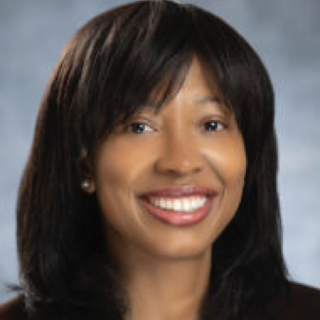

9:15-10:45 Research Into Practice
Location: N420/N424
Integrating Relational Coordination with Social Networks
Facilitators: Christina Yuan (Johns Hopkins University) and Birgitte Toring (Act2Learn)
Integrating Network Theory into the Study of Integrated Healthcare
Ingrid Nembhard (The Wharton School, University of Pennsylvania), Lawton R. Burns (The Wharton School, University of Pennsylvania) and Stephen Shortell (University of California, Berkeley)
Strengthening Networks for Youth to Adult Mental Health Transitions: A Multi-Level Intervention
Richard Wylde (National Health Service), Claire Kenwood (National Health Service), Eddie Devine (National Health Service), Heba Naim Ali (Brandeis University, RC Analytics) and Jody Hoffer Gittell (Brandeis University)
Relational Coordination and Social Network Analysis in Defining Relationships in the Operating Room
Kent Haythorn (Scripps Health)
Social System Mapping and Relational Coordination: Theory and Practice for Resiliency
Jim Best (Independent Consultant)
Digitalization, Relational Coordination, and the Future of Work
Facilitators: Wale Olaleye (Deloitte Human Capital; Brandeis University) and Vanessa Hurley (Georgetown University)
Digital Technology, Human Relationships and Work: Who Will Determine What the Future Will Be?
Erik Nicholson (Pandion Strategies) and Alexia Estrada (Semillero de Ideas)
Human-AI Interdependence in Post-Digital Organizations: Understanding the Role of Human Autonomy in an AI Mediated World
Kartik Trivedi (Brandeis University)
Impact of Secure Messaging on Health Equity and Type 2 Diabetes Outcomes During The COVID-19 Pandemic
Ben Kragen (The Carsey Institute, University of New Hampshire)
Revealing Interdependencies: Overcoming Data Sharing Barriers to Build a Relational Ecosystem
Ina Sebastian (MIT Center for Information Systems Research), Nils Fonstad (MIT Center for Information Systems Research) and Thomas Haskamp (Hasso Plattner Institute at University of Potsdam)
Coffee Break
Location: Hub
11:00-12:30 Research Into Practice
Location: N420/N424
Scaling Relational Coordination Across Multiple Sites for Greater Impact
Facilitator: Bethlyn Gerard (Southwestern Health Resources) and Kartik Trivedi (Brandeis University)
Improving Relational Coordination in a Regional Triage Program at Atrius Health
Daniel Slater (Atrius Health)
Shared Care: CF Referral and Transplant Programs Improving Communication, Relationships and Systems of Shared Care
Marjorie M. Godfrey (University of New Hampshire) and Christian Merlo (Johns Hopkins University)
Disseminating and Sustaining Relational Coordination in the Veterans Health Administration
Brigid Connelly (Denver/Seattle Center of Innovation, Veterans Health Administration) and Heather Gilmartin (Denver/Seattle Center of Innovation, Veterans Health Administration)
Baseline Relational Coordination Prior to Implementation of Reflex Genomic Testing in an Academic Cancer Center: A Mixed Methods Approach to RC Diagnostics
Shellie D. Ellis, Zseraldina Ferenczi, Caroline Caine, Sam Boyd, Whitney Onasch, Chao Huang, Joaquina Baranda, Rashna Madan, Daniel Farrell, Heather Nelson Brantley, Aaron Katz, Matthew Lineberry, Andrew K. Godwin (University of Kansas Medical Center) and Jody Hoffer Gittell (Brandeis University)
Moving Knowledge Into Action Through Research/Practice Partnerships
Facilitators: Tony Suchman (Relationship Centered Health Care) and Cecile Foshee (Cleveland Clinic)
Knowledge Translation across Boundaries: Translation Strategies for Converting Scholarly Knowledge to Practitioner-Oriented Insights
Isabelle Yi Ren, Montclair State University; Jean Bartunek, Boston College; Mara Cable, Boston College
Relational and Structural Components of Innovativeness Across Academia and Practice for Progress Scale (IA-APPS)
Lindell Joseph (University of Iowa College of Nursing) and Michele Williams (University of Iowa)
The Development and Application of Relational Facilitation in the Veterans Health Administration
Heidi Sjoberg, Brigid Connelly, Brianne Morgan, Rachael Kenney, Catherine Battaglia and Heather Gilmartin (Denver/Seattle Center of Innovation, Veterans Health Administration)
The Good, Bad, and Indifferent: Landlord Logics and the Institution of Low-Income Private Rental Housing
Anna Perlmutter (Case Western Reserve University) and Scott Kroehle (Cleveland Housing Solutions)
12:30-2:00 Lunch with Keynote Speaker and Discussion
Location: Auditorium
Jean Bartunek, Professor, Boston College
Boundary Work - Moving Knowledge Into Action as a Scholar/Practitioner
Discussion facilitated by Anne Douglass (Executive Director, Professor, University of Massachusetts Boston)
2:00-3:30 Research Into Practice
Location: N420/N424
Relational Coordination as a Driver of Worker Well-Being
Facilitators: Alice Andrews (Dell Medical School; Geisel School of Medicine, Dartmouth Hitchcock) and Aoife McDermott (Cardiff University; University of California Berkeley)
Finding Joy in Work: Lessons from High Performing Healthcare Teams
Heather M. Gilmartin (Denver/Seattle Center of Innovation, Veterans Health Administration), Brigid Connelly, Denver/Seattle Center of Innovation, Veterans Health Administration) and Catherine Battaglia (Denver/Seattle Center of Innovation, Veterans Health Administration)
Relational Coordination Among Care Providers in Canadian Long-Term Care Homes
Lisa Cranley (University of Toronto), Whitney Berta (University of Toronto) and Daniyal Zuberi (University of Toronto)
Relational Coordination: A Valid Tool for Addressing Nursing Faculty Moral Distress
Teresa M. Stephens (RN P.R.E.P.)
Relationships: The "Secret Sauce" in Building Resilient Academic Teams
Teresa M. Stephens (RN P.R.E.P.)
Strengthening Relational Coordination at the Systems Level
Facilitators: John Paul Stephens (Case Western Reserve) and Theodore "Jack" Iwashyna (Johns Hopkins School of Medicine)
Adaptive and Resilient Organizations: The Role of Senior Leaders In Developing High RC Organizations
Carsten Hornstrup (Joint Action Analytics)
Using the Relational Coordination Framework to Strengthen Networks for Integrated Equitable Healthcare and Social Care Systems in Canada
Grace Liu (York University) and Peter Tsasis (York University)
Understanding How Relationships Influence the Implementation of Complementary and Integrative Health Therapies in Whole Health Systems
Rendelle Bolton (US Veterans Health Administration)
Relational Coordination in a VA Medical Center Engaged in Transformation to a High Reliability Organization
Samuel Edwards (VA Portland Health Care System / RELATE Lab OHSU), Avery Laliberte (VA Portland Health Care System), Brian Park (RELATE Lab OHSU) and Martha Gerrity (VA Portland Health Care System)
3:30-5:00 Local Innovations and Interactive Posters - with Cookies, Coffee and Conversation!
Location: Lobby/Hallway
Local Innovations
Local Innovations - Unlock the Power of Data for Public Good
Amy Edwards Holmes (Executive Director, Bloomberg Center for Government Excellence, Johns Hopkins University). Join the Bloomberg Center for Government Excellence at Johns Hopkins University to discover how we use math, statistics, and coding to support governments with data, insights, and science translation to make informed decisions. We will facilitate a tour across our most relevant projects and demo tools we have developed for data democratization through engaging visualizations. Additionally, we will share insights into our work process to find stories in the data and translate them into meaningful and usable information.
Interactive Posters
Epistemology of Net Zero: Reimagining our Climate and Energy Worlds Beyond 2035
John W. Ballantine (Brandeis University)
Understanding Organizational Ideology: An Examination of Leadership Behavioral Responses to Polarization in So Called Nonpartisan Federal Institutions
Abdullah H. Clark (National Defense University, George Washington University)
Strategies and Initiatives to Enhance Rural Maternal Health
Chinue Uecker (LPI Consultants, SEI, Cornell, The Chicago School); Danita Richardson (The Chicago School)
Uncharted Territory: Exploring Long-Term Peer Coaching Groups as a Tool for Leader Development
Roman Terekhin (Case Western Reserve University)
Enhancing Teamwork Through a Relational Coordination Training Intervention in the Intensive Care Unit: A Pilot Study
Sherita House (University of North Carolina Greensboro), Hebatallah Naim Ali (Brandeis University), Cindy Bacon (University of North Carolina Greensboro) and Christopher Stucky (Landstuhl Regional Medical Center)
Intervening to Strengthen Relational Coordination in User-Centered Models of Service Delivery
Lauren Hajjar (Suffolk University), Hebatallah Naim Ali (Brandeis University), Jody Hoffer Gittell (Brandeis University) and Monica Higgins (Harvard Graduate School of Education)
An Exploration of Culture, Health, and Wellness of Costa Rica's Migrant Workers
Danita Richardson (The Chicago School), Mehreen Khan (The Chicago School), Chinue Uecker (LPI Consultants, SEI, Cornell, The Chicago School) and Marianne Jankowski (The Chicago School)
5:00-6:30 Innovation Labs
Location: Carpenter A/Carpenter B
Strengthening Networks for Equitable Integrated Healthcare
Led by Masami Tabata-Kelly (Brigham & Women's Hospital, Brandeis University), Wale Olaleye (Deloitte Human Capital, Brandeis University) and Christina Yuan (Johns Hopkins School of Medicine)Relational Coordination in Higher Education
Led by Jeffrey Grim (George Mason University), Teresa Stephens (R.N. Prep) and Birgitte Torring (act2learn; University College Northern Denmark)Building Relational Capacity for Resilient Communities
Led by Lauren Hajjar (Suffolk University), Carsten Hornstrup (Joint Action Analytics) and Rumana Shams Rabbani (UNC Chapel Hill; CHASM)Digitally Enabled Ecosystems for Innovation
Led by Ina Sebastian (MIT Center for Information Systems Research) and Tomaz Sedej (Hyperledger Foundation)RCC Community Building Innovation Lab
Led by Jim Best (Independent Consultant) and Richard Wylde (Yorks/Leeds Trust, National Health Service)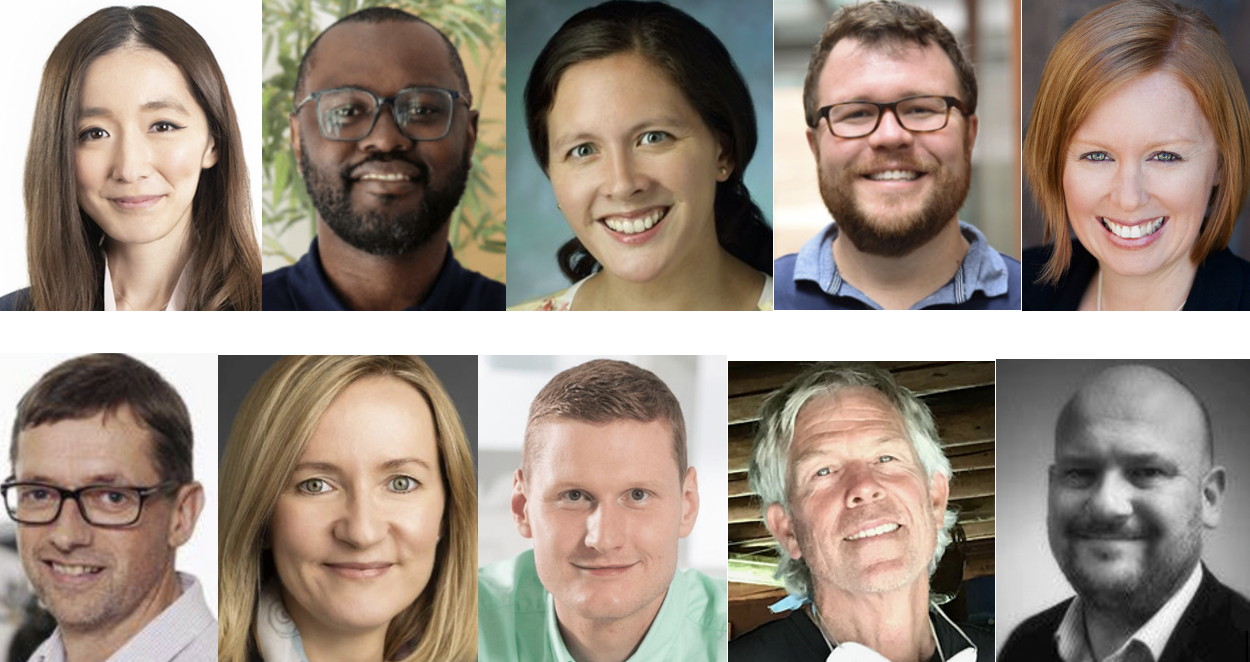
6:30-8:00 Dinner Reception
Location: Hub
Day 3: Saturday Oct. 28
Johns Hopkins University School of Nursing, 525 North Wolfe Street, Baltimore, MD
8:30-9:30 Breakfast, Mentor Match-Ups, Welcome from Host Committee
Location: Hub/Carpenter A
Martha Gerrity (Portland Veterans Administration, Society of General Internal Medicine)
Christina Yuan (Department of Health Policy and Management, Bloomberg School of Public Health)
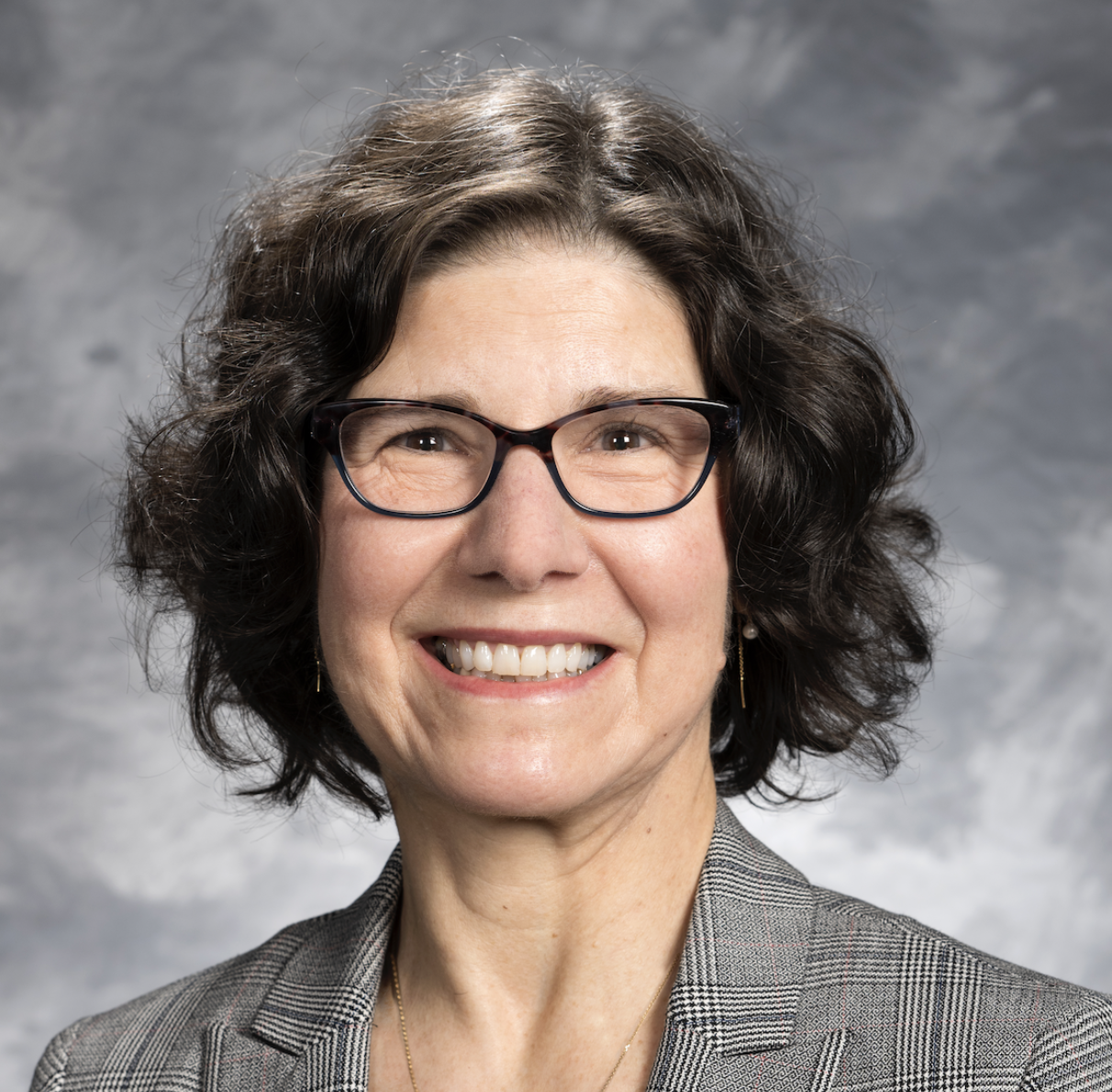
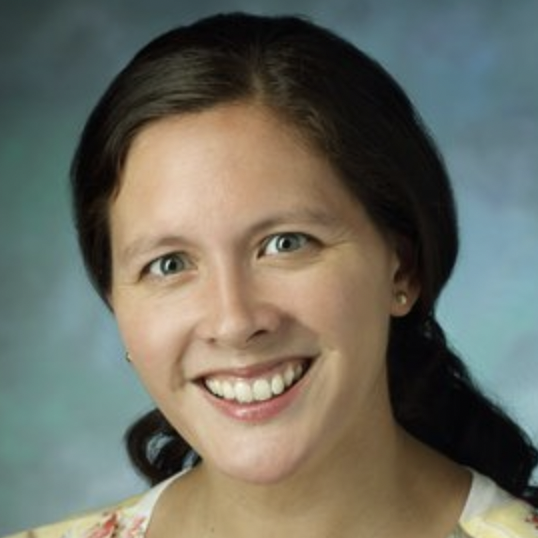
9:30-11:00 Research Into Practice
Location: N420/N424
Coordinating Care Across Healthcare Teams
Facilitators: Kathie Sutcliffe (Johns Hopkins University) and Casey Heely (Brandeis University)
Hospital Observation Services with Rapid Rounding: Managing Uncertainty in Workflow through Relational Coordination
Paulo J. Gomes (Florida International University), Tala Mirzaeim (Florida International University, Baptist Health System) and Raphael Yonemura (Baptist Health System)
Applying Relational Coordination to Strengthen Interdependence Among Health Care Team Members During Bedside Rounding
Dorna Hairston (Johns Hopkins Hospital Office of Nursing Professional Practice), Ginger Hanson (Johns Hopkins School of Nursing) Kathy McDonald (Johns Hopkins University), Elizabeth Tanner (Johns Hopkins School of Nursing and School of Medicine), Anping Xie (Armstrong Institute for Patient Safety and Quality), Mona Bahouth (Johns Hopkins School of Medicine) Tenise Shakes (Johns Hopkins Hospital), Erin Blakeney (University of Washington School of Nursing), Rachel Salas (Johns Hopkins School of Medicine) and Bryan Hansen (Johns Hopkins School of Nursing)
How Do Hospitalized Patients with a Diagnosis of Advanced Heart Failure Perceive Relational Coordination with their Inpatient Care Team? Preliminary Results from an Ongoing Study
Erin Blakeney (University of Washington), Brenda Zierler (University of Washington) and Giovanna Abraham (University of Washington)
Creating a Relational Playbook for Cardiology Teams to Enhance Employee Well-Being and Veteran Care
Heather Gilmartin (Denver/Seattle Center of Innovation, VA Eastern Colorado Healthcare System), Brigid Connelly (Denver/Seattle Center of Innovation, VA Eastern Colorado Healthcare System), Edward Hess (Denver/Seattle Center of Innovation, VA Eastern Colorado Healthcare System), Candice Mueller (Veterans Health Administration), Meg Plomondon (Veterans Health Administration), Stephen Waldo (Veterans Health Administration) and Catherine Battaglia (Veterans Health Administration)
Developing Relational Leadership
Facilitators: Roman Terekhin (Case Western Reserve University) and Jill Marsteller (Bloomberg School of Public Health, Johns Hopkins University)
Leadership, Relational Coordination, and Child Care Quality Improvement
Anne Douglass (University of Massachusetts Boston)
Leadership Development in an NGO Using Relational Coordination
Jonas Hedegaard (Team WorkingLife)
How COVID-19 Hit Healthcare Twice: The Role of Agile Leadership
Danita Richardson (The Chicago School), Freimut Juengling (University of Alberta Cross Cancer Institute), Chinue Uecker (LPI Consultants, SEI, Cornell, The Chicago School)
Managing by Relating: Understanding Professional Management of Hospital Executives Under New Medical Reform in China
Qian Zhang (University of Ottawa), Hao Gong (University College London), Hangzhou Ruilian (Zhitong Healthcare Management Consulting), Cheng Huang (Shanghai Jiao Tong University) and Ge Shi (Xinhua Hospital and Shanghai Jiao Tong University)
Coffee Break
Location: Hub
11:15-12:45 Professional Development Workshops
Location: Carpenter A/Carpenter B/N231
Designing Relational Coordination Interventions for Equity and Performance
Facilitators: Wale Olaleye (Brandeis University, Deloitte Human Capital) and Jody Hoffer Gittell (Brandeis University)
Relational coordination began as a theory for understanding how people coordinate their work through relationships, and how the quality of these relationships impact performance outcomes (Gittell, 1995; Gittell, 2009). In the past ten years, relational coordination theory has evolved into the Relational Model of Organizational Change developed with colleagues in the US and around the world (Gittell, 2016). Informed by this model, multiple interventions have been carried out, some of which have been published (e.g. Suchman, et al, 2011; Perloff, et al, 2017; Blakeney, et al, 2019; Hajjar, et al, 2020; Blakeney, et al, 2021; Thygeson, et al, 2021; Olaleye, 2022; Warfield, et al, 2022; House, et al, 2023).
In this workshop we will introduce the Relational Model of Organizational Change, and focus on how to design relational, structural and work process interventions. As facilitators, we will draw upon our experiences working in partnership with health systems, for example the Relating Across Difference intervention developed with Cleveland Clinic. We will start by introducing general principles of intervention design, then specific principles of designing interventions to strengthen relational coordination with attention to both equity and performance. Participants will work in small groups to design interventions for their own context, using tools from the Relational Coordination Playbook, with coaching from facilitators and from their peers.
Adapting the Transition in Care Model by Leveraging Relational Coordination
Facilitators: Marjorie M. Godfrey (IEHSS, University of New Hampshire) and Tanya Allain (IEHSS, University of New Hampshire)
This highly interactive workshop will share a multi-system level model of improvement centered around patients and families to co-produce "pathways" of care between two or more microsystems. Participants will be able to utilize several case studies to practice activities of the transition model of care from assessing current context and performance, coaching relational mapping and RC survey administration, analysis and reporting, adapting field tested interventions to improve communication and relationships and develop leadership to advocate and support the improvement of patient centered pathways across multiple contexts of care delivery. Key relationship building strategies, essential processes of care delivery and increasing shared knowledge of each context of care delivery with a shared vision will be highlighted. Each participant will complete the session with an action plan. OF NOTE: Participants may bring their own "pathway" information and data to focus the workshop on to develop a clear action plan for when they return to their own practice.
The Pressure Matrix: An Approach for Understanding Teams and Choosing Interventions
Facilitators: Alexandra Suchman (Barometer XP) and Tony Suchman (Relationship-Centered Health Care)
As awareness of relational coordination continues to grow rapidly, so does interest in relational interventions. New approaches are needed to categorize relational interventions and help consultants, leaders and/or managers choose interventions for their particular situations or needs. We describe a new tool for this purpose called the Pressure Matrix. The Pressure Matrix is a nine cell grid that characterizes how people experience their work environment and how integrally connected individuals’ experiences are to the overall health of the team and organization. Although its terminology is different, the Pressure Matrix includes elements of Relational Coordination (shared goals, mutual respect, effective communication) The nine dimensions are organized along two axes. - The columns reflect three dimensions of how individuals experience and engage in their work: Feel, Think, and (Re)Act. - The rows reflect three dimensions of how the organization’s work is conceptualized and executed: Why (related to purpose and values), What (related to strategy and metrics), and How (related to process). - Each cell represents the domains or activities that sit at the intersection of one individual and one organizational dimension. For instance, the cell “Identity and Belonging” characterizes the intersection of Feel (individual level) with Why (organizational level).”Growth and Development” sits at the intersection of Think and What; “Tools and Capacity” represents the intersection of (Re)Act and How. The Pressure Reading is a survey comprised of questions that assess each of the 9 cells. It can be completed by the team leader or all the team members. The pattern of results highlights strengths and pressure points within the team.
Each cell has associated game-based interventions that promote learning and development for that particular function or domain, so the Pressure Matrix serves as a catalog of interventions, guiding leaders or to consultants to the most relevant interventions for a given pattern of survey results. For example, the cell Identity and Belonging reflects the extent to which individual team members feel safe to show up authentically at work, feel like they are a vital part of a larger whole, and feel that their work contributes to the overall mission and impact of the organization. When Identity and Belonging is strong, individuals feel connected and motivated both as individual contributors and as a group unified by its shared commitment. If a team is looking to foster a stronger sense of Identity and Belonging, the Pressure Matrix suggests a game called Scavenger Hunt that involves personal storytelling to give colleagues an opportunity to get to know each other better and learn about each other’s unique strengths and experiences. In this presentation we will describe the Pressure Matrix in greater detail and share case studies showing how it has been used to help teams take stock and plan interventions. We will also discuss plans for future research and application.
12:45-2:00 Lunch with Keynote Speaker and Discussion
Location: Auditorium
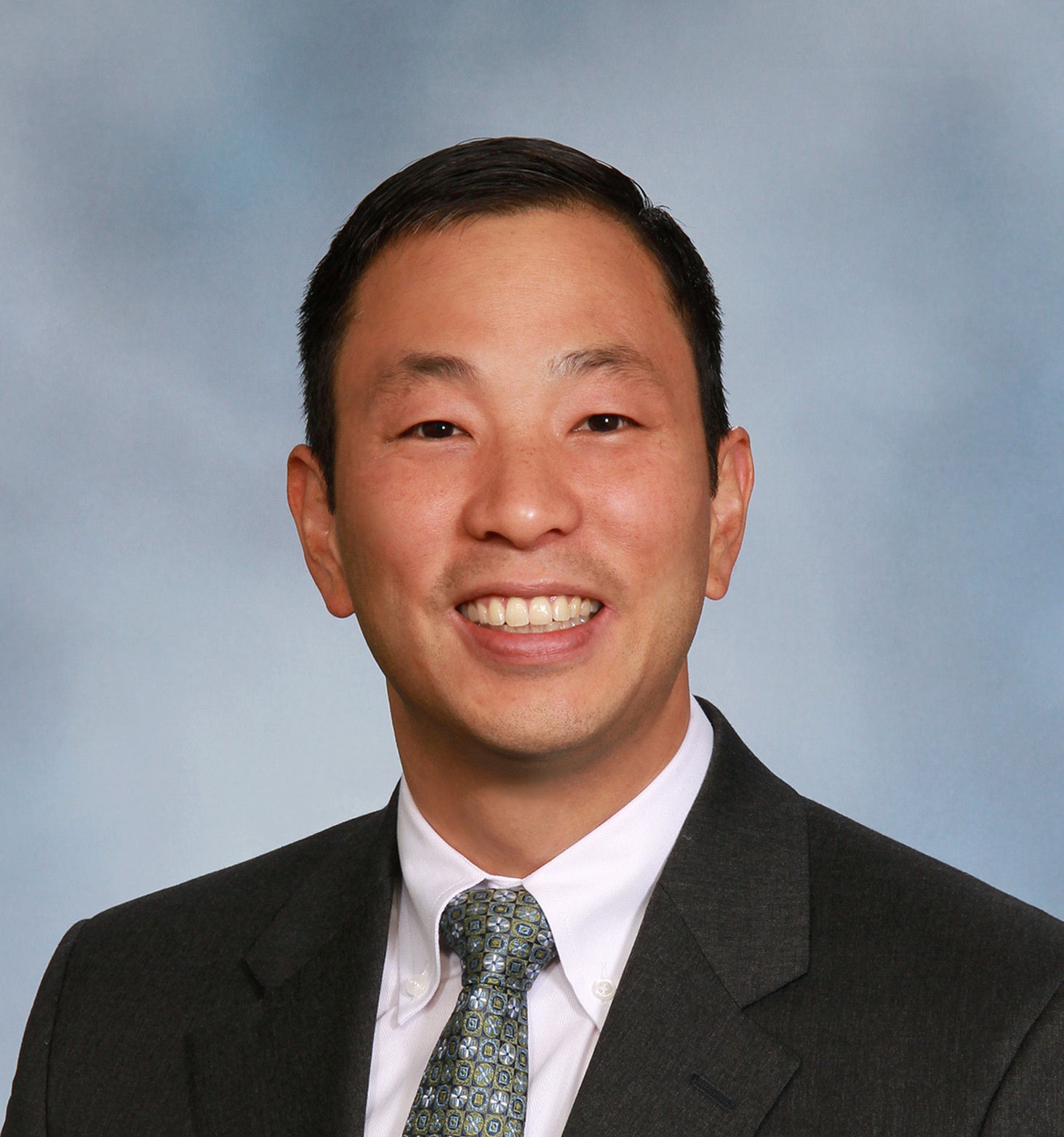
Patrick Lee, Chair of Medicine, One Brooklyn Health
Leading With Love - Transforming Healthcare Through Relationships
Discussion facilitated by Daniel Slater (Executive Chair, Primary Care, Atrius Health)
2:15-3:45 Research Into Practice
Location: N420
Building Relationships Across Professional and Social Identity Differences
Facilitators: Masami Tabata Kelly (Brandeis University) and Njoke Thomas (Boston College)
Identity Disclosure as a Relational Intervention
Ryan Scott Teschner (University of Texas at Dallas) and John W. Lynch (University of Illinois at Chicago)
Enhancing Gender Equity in Workplace Relationships: The Impact of Expressing Gratitude and Top Management Gender Diversity
Hun Whee Lee (Ohio State University), Dorian Boncoeur (University of Notre Dame), Joanna Lin (University of Georgia) and Brent Scott (Michigan State University)
Relating Across Difference: An Improvement Process for Clinical Teams at Cleveland Clinic
Cecile Foshee (Cleveland Clinic), Jody Hoffer Gittell (Brandeis University), Aanchal Kapoor (Cleveland Clinic), Olawale Olaleye (Brandeis University, Deloitte Human Capital), Tyler Reimschisel (Cleveland Clinic), Tony Suchman (Relationship Centered Health Care), and Chiedozie Udeh (Cleveland Clinic)
Community Health Workers Advance Equity and Violence Prevention Through Relationships and Readiness for Change
Rumana Shams Rabbani (UNC Chapel Hill, CHASM), Abdul Hafeedh bin Abdullah, CHASM), Lauren Hajjar (Suffolk University), Abraham Wandersman (The Wandersman Center), Brittany Cook (The Wandersman Center), Jennifer Perloff (The Heller School, Brandeis University) and Jody Hoffer Gittell (The Heller School, Brandeis University)
Coffee Break
Location: Hub
4:00-5:30 Professional Development Workshops
Location: Carpenter A/Carpenter B/N231
Reframing Readiness and Scheduling Challenges as Intervention Design Opportunities
Facilitator: Krista Hirschmann (Enhance Communication)
Gittell and Fletcher’s article on Integrative Solutions in a Divided World highlights Jean Baker Miller’s paradigm shift of human development from individuation to “increasing proficiency in relating with others." Inspired by these ideas, this workshop will explore the tension between structural priorities and intervention design. On the surface, I am an external coach asked to “improve team dynamics” in a Bariatric Medicine practice that is part of a large academic health network, which spans 13 hospital campuses. The practice context is not entirely unique to the network or healthcare in general. They were post COVID, short on staff, had turned over 3 Practice Managers (2 during the time of my involvement) did not have a Medical Director or readily available leadership, suffered from other examples of role clarity, and were going through series of programmatic changes, just to name a few challenges. Time spent with the team in both 1:1 conversations, observations, and a few structured workshops revealed an important pattern over 18 months of intermittent interaction.
While relational coordination provided a useful framework to facilitate immediate team dynamics, progress was painfully hampered and delayed by seemingly two unrelated factors: 1. Low level of readiness 2. Logistical complexity of availability In the case of readiness, it is easy to think (by myself and others) that specific personalities are being “resistant,” or are not “self-aware.” Likewise, issues with logistical complexity, or simply finding time to meet, led to language of “competing priorities,” “being overwhelmed,” and the ultimate card--protecting clinical schedules and patient access. In fact, however, these two barriers are deeply interrelated and manifested in the questions posed by Gittell and Fletcher. Specifically, they reflect on the social and organizational prioritization of relational skills, particularly as it relates to leadership and power. Furthermore, they reflect the fractal nature and self-similarity of relational systems, notably illustrated by identical complaints from both executive leaders and frontline staff longing for more connection, communication, and collaboration with colleagues and leaders.
In this case, the structural dynamics of the organization and health care at large privilege the visible clinical work over the invisible relational work. While it might seem wildly counterintuitive to flip this paradigm in a healthcare setting, doing so acknowledges that the clinical work is built on and driven by relational dynamics. Until there is a shared cultural norm that says “fix the relationship first” rather than “if you have a chance,” all people in the system and outcomes will suffer. In this workshop we will explore specific micro and macro examples (including one viral situation) of these patterns at play throughout the network. Participants will share similar situations they have faced, and together we will develop solutions for how to address these dynamics when they arise.
Mapping Ourselves Together: A Hands-On Tutorial
Facilitator: Jim Best (Independent Consultant)
Social System Mapping is a tool that can support a community wanting to build resilience for itself. The self-awareness can amplify and stimulate a more robust, connected, relationally rich, information-sharing, regenerative, learning, innovative, self-organizing, and playful community. The RCC Community Building Innovation Lab is experimenting with a Social System Map that enables the kind of collective and individual self-awareness that fuels those outcomes. This is a hands-on, laptop tutorial. At the end of it you will know: – what a Social System Map is – a mashup of other maps you may be familiar with (asset map, social network map, systems map, etc.) – how to use it as a visual directory of RCC map participants – how to put yourself on the map (or take yourself off) – how to update the connections you make at this Roundtable and after – how to navigate the map views, filter, cluster, showcase, and focus on aspects of the community to help you make sense of how the RCC is relationally organized and evolving – how this is useful for connecting yourself to the rich human resources in the RCC – why this mapping can enable us to begin to shift our perspective from an individual mindset to a network or relational mindset – and why this shift is important to building capacity through the connective tissue of a resilient, regenerative community.
As we move through the tutorial and the map builds before our eyes we’ll explore the map views and talk about what we notice. Then we’ll use it to find others in the community that you might want to build relationships with at some point. Finally, we’ll explore together what might be useful information to include on the map that isn’t there now and how that might serve our collective purpose. Participants will come away with a richer and new way to view the RCC community and a tool to connect and build relationships “Beyond the Roundtable” in the year ahead.
Power Up Your Team: Enhancing Self Awareness to Grow Shared Power
Facilitators: Jane Cooper-Driver (Intend Health Strategies) and Jennifer Agwagom (Geisinger Commonwealth School of Medicine)
Structural inequities exist for patients and team members in all aspects of healthcare, and they are a significant barrier to creating interdependent networks. They also prohibit connection among team members who have diverse professional and social identities. We need effective strategies to address these inequities, and one approach is relational leadership (RL). RL is a human-centered approach to working with others that cultivates connection and awareness to increase belonging, collaboration, equity, and impact across health systems. RL is vital for care teams to lead change and advance diversity, equity, inclusion, and accessibility. This workshop will introduce participants to RL core practices to advance self-awareness, enhance connection with others, and deepen a sense of purpose. People are multi-faceted, and workshop participants will explore their identities and positionality.
Workshop participants will be given time to self-reflect on various aspects of their identities, how those components are interconnected, and what part of their identity is visible to others. They will discuss in small groups what the self-reflection exercise was like for them, how identity and positionality impact their current teams, and how increased awareness could build relationships and lead to interdependence. Participants will learn about and explore their sources of power. Self-awareness includes knowing how our identity impacts our biases and informs our interactions with others, including how we wield power. Addressing power dynamics can advance equity by re-distributing power in our practices, creating opportunities for input and decision-making for all members of the team. Participants will discuss how a “power with” approach is or could be used on their teams in small groups. Interprofessional healthcare teams must learn RL skills to enhance trust and engagement. If teams do not incorporate a relational mindset, they risk constraining improvement efforts, increasing workforce burnout, and preventing interdependent collaboration. Additionally, power imbalances can impede team-based care, leading to poorer quality and suboptimal clinical outcomes.
5:30-5:45 Moving Knowledge Into Action Together - Closing Reflections and Meet Up in the Inner Harbor!
Location: Hub
Kathryn McDonald (Schools of Nursing, Medicine, Public Health and Business, Johns Hopkins University)
John Paul Stephens (Weatherhead School of Management, Case Western Reserve University)
Kathy and JP will offer closing reflections then suggest people meet up in the Inner Harbor. There are several outdoor pubs in Fells Point and we are expecting a beautiful day!


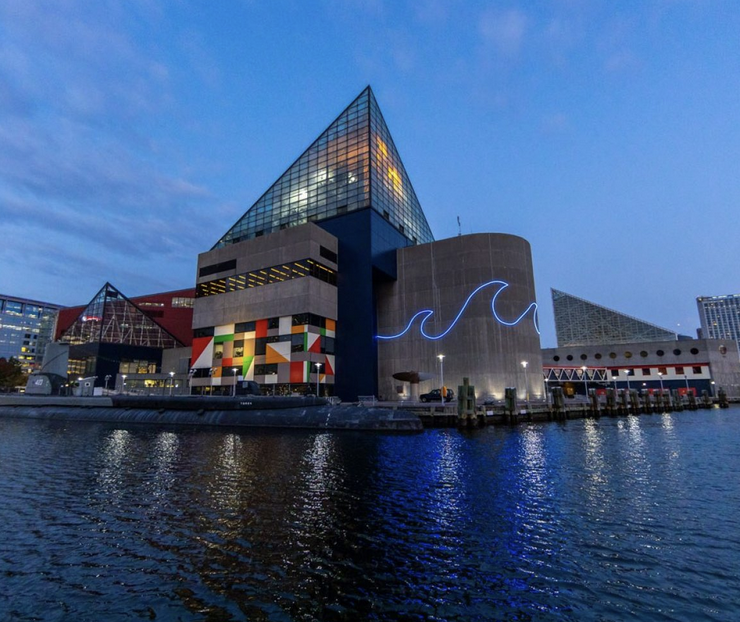
Day 4: Sunday Oct. 29
Local Touring, Meet Up With Colleagues and Friends
Sunday morning you can meet colleagues and friends for brunch at The Rusty Scupper with sweeping views of the Inner Harbor, then walk the Inner Harbor Trail. You can tour the USS Constellation, visit Fort McHenry National Monument where Francis Scott Key was inspired to write the Star Spangled Banner during the War of 1812, or visit the National Aquarium to learn about animals from all over our planet. Go beyond the Inner Harbor to discover Baltimore's diverse neighborhoods, including Little Italy and Fell's Point where you can eat crabs from the restored waters of the Chesapeake Bay.

